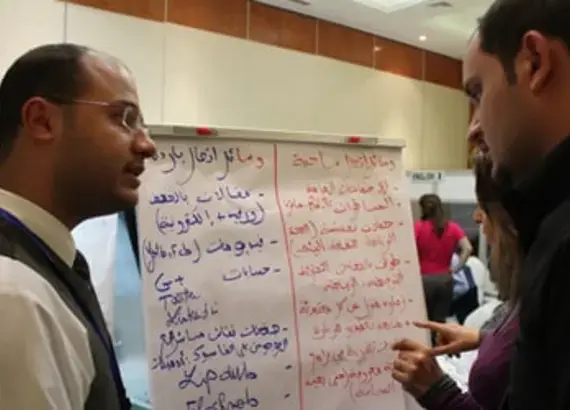
Success Story
Tunisia Campaign School Helps Aspiring Politicians across the Middle East and North Africa
Wafa Bani Mustafa had already won a seat in Jordan’s parliament. But as she prepared to run for reelection, she wanted to learn more about fundraising techniques, which are not widely used in the region. So last December, ahead of her campaign, she participated in an NDI training program on advanced campaign skills for experienced politicians from 11 countries in the Middle East and North Africa (MENA).
The training allowed Bani Mustafa—an alum of previous NDI programs in Jordan—to build on her experience by learning about voter contact, message development and fundraising. The training also provided pointers on how to use what she learned to help other aspiring politicians. She won reelection in January, garnering enough votes to score a seat beyond the women’s quota, which sets aside 15 out of the 150 seats in parliament for women. “If you want change, seek the change,” she said.
Bani Mustafa and three of her colleagues in the December training program went on to become trainers for NDI’s regional campaign school in Tunis, Tunisia, March 15-19. The school, part of a two-year program supported by the Middle East Partnership Initiative (MEPI), helps prepare prospective candidates and campaign managers to define messages, communicate with the public, and run campaigns that are more responsive to voters. The program also focuses on helping women and young people become more competitive candidates.
Forty-eight participants representing a range of political parties from eight countries—Bahrain, Iraq, Jordan, Lebanon, Libya, Morocco, Tunisia and Yemen—attended. Twenty-three of the participants were women and more than 60 percent were under the age of 40. As part of the program, NDI also developed a handbook with 11 modules for building an effective campaign, such as message development, targeting voters and fundraising.
In one of the school’s most popular activities, participants divided into smaller groups, or “parties,” to compete against one another in a mock election. The “parties” chose campaign roles for each member, set vote goals, developed and carried out voter targeting plans, and prepared a campaign plan that was presented to the larger group. At the end of the school, participants voted to “elect” the group with the best strategy.
“I am a living example of the [campaign school] handbook,” said Nadine Moussa, who is running for parliament in Lebanon. Since returning from the school, Moussa has devised a campaign strategy and plan, targeted voters, recruited volunteers, and gone door-to-door to talk directly with voters. She is running with a group of reform-minded, independent candidates called “Take Back Parliament.” Moussa has shared the handbook within the group and is helping other candidates develop messages, plan fundraising events and canvass for support.
Other graduates of the March school also are testing their new skills. An Iraqi participant is planning training sessions for members of his party and other political activists using the campaign school curriculum and materials. He plans to incorporate the new skills—like developing a campaign plan, setting vote goals and improving media relations—into his daily work as a member of his party’s election office. A participant from Jordan is using the communication and volunteer recruitment techniques he learned through the program to launch a civic education initiative called “my home, my school,” which strives to raise youth political awareness at schools in remote areas. And several Tunisian participants are using lessons on campaign planning and strategy to prepare for upcoming elections.
The Regional Campaign Schools program is funded by the State Department’s Middle East Partnership Initiative (MEPI). The second regional campaign school will take place in Amman, Jordan, in the fall.
Read more:
Published May 8, 2013



